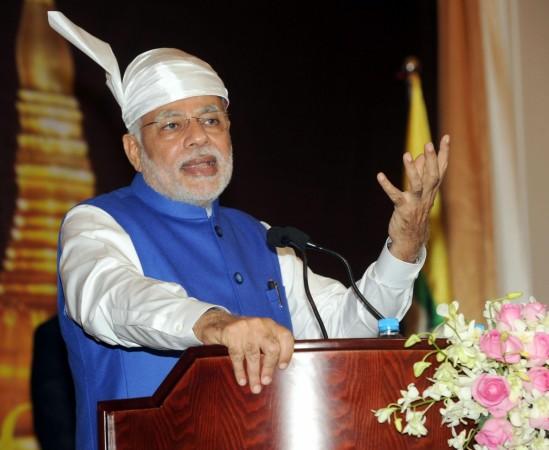
Indian Prime Minister Narendra Modi on Thursday spoke strongly on the issue of terrorism at the East Asia Summit (EAS), calling for a "genuinely international partnership against all terrorism" and to reject any linkage between religion and terrorism.
On day three of his engagements in the Myanmar capital, Modi also spoke of the need to maintain peace and stability in South China Sea.
He held meetings with a number of leaders for the first time - Russian Prime Minister Dmitry Medvedev, Chinese Premier Li Keqiang and Indonesia's Joko Widodo.
Addressing the summit, Modi said India supports the East Asia Summit Declaration on the Islamic State jihadist group.
The rise of jihadist group Islamic State, which indulges in brutal killings and declaration of a caliphate in areas overrun by it in Syria and Iraq is a major cause of concern in the world, said Modi.
About dealing with the challenges of terrorism and extremism Modi said, "We have to ensure that cyber and space remain a source of connectivity and prosperity, not new theatres for conflict".
In reference to the territorial conflicts in the South China Sea, he said: "Following international law and norms is important for peace and stability in South China Sea as well."
"In a world of inter-dependence and globalisation, there is no option but to follow international laws and norms," Modi added.
Referring to the Ebola virus outbreak in West Africa, he said it has highlighted the importance of international cooperation in combating pandemics.
Modi informed the gathering that India has contributed $12 million in the efforts against Ebola.
On India's outreach to Southeast Asian countries, Modi said his government has moved with "a great sense of priority and speed" to turn the 'Look East Policy' into the 'Act East Policy'.
"No other forum is so critical for peace, stability and prosperity in Asia-Pacific and the world," he said of the East Asia Summit which brings together more than 18 leaders -- the 10 ASEAN leaders and eight others, including the US, China, Russia, South Korea, Japan and Australia.
He suggested that countries could "start major initiatives on energy partnership, for example, in the area of solar energy with the objective of bringing affordable, clean energy within the reach of all".
Modi said a "balanced Regional Comprehensive Economic Partnership (RCEP) agreement which gives equal emphasis to goods and services, could be a springboard for regional integration and prosperity".
The RCEP trade agreement is being negotiated by the EAS countries.
Ahead of the summit, Modi began the day with a bilateral meeting with Medvedev, that comes ahead of the bilateral summit meeting with Russian President Vladimir Putin in December in New Delhi.
He also met China's Li and Widodo during separate delegation level talks.
Modi addressed the Indian diaspora in the evening before heading for Brisbane in Australia for the G20.
Over the past two days, Modi has met a host of leaders from the Southeast Asian countries, including from Malaysia, Singapore, Brunei, and also shook hands with US President Barack Obama who called him "a man of action".
In Australia, he would be holding more meetings with world leaders and then after talks with Australian Prime Minister Tony Abbott, he would fly to Fiji.









